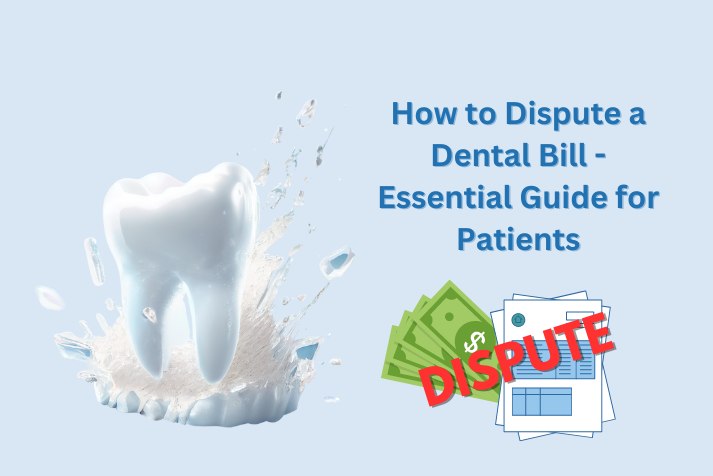This information is crucial for patients who feel overcharged, insurance policyholders, and anyone interested in healthcare financial advocacy. Understanding your rights and the appropriate procedures can make a significant difference in managing dental care costs.
This guide will help you through the essential steps to dispute a dental bill effectively.
Introduction to Dental Bill Disputes
Understanding how to dispute a dental bill is essential for anyone who feels overcharged or misbilled. This section explains why it’s crucial to be informed and the reasons why disputes arise.
Why It’s Important to Understand Your Dental Bill
Patients should understand their dental bills to ensure they’re paying only for the services received and at the correct rates agreed upon with their providers and insurance. Understanding your bill can help you identify any differences or errors that need addressing.
Common Reasons Patients Dispute Dental Bills
Patients often debate dental bills due to misunderstandings about insurance coverage, discrepancies in the service charged versus the service provided, and billing errors. Recognizing common issues can empower patients to initiate effective disputes.
Preparing to Dispute Your Dental Bill
To effectively challenge a dental bill, meticulous preparation is key. This section outlines the critical steps to review and document your case before initiating a dispute.
Review Your Bill Carefully
Examine every detail of your dental bill to ensure the accuracy of each charge. Compare the listed procedures with your treatment records and confirm that the services billed were provided. Understand the coding used, as errors are a common cause for disputes.
Gather Necessary Documentation
Collect all relevant documents that support your claim. This includes detailed treatment records, previous billing statements, your insurance policy’s explanation of benefits (EOB), and any correspondence with your dental care provider. These documents are crucial for supporting your case should you go up the dispute.
Analyzing Coverage: What Insurance Pays vs. What You Pay
The table can help patients understand their potential financial responsibilities when receiving dental treatments.
| Service | Typical Insurance Coverage | Patient’s Direct Billing |
| Routine Check-up | 100% covered (no deductible) | $0 (covered by insurance) |
| Dental Cleaning | Typically covered twice a year at 100% | $0 (covered by insurance) |
| Fillings | 70%-80% after deductible | 20%-30% of the total cost + deductible |
| Crowns | 50% after deductible | 50% of the total cost + deductible |
| Extractions | 50%-80% depending on the plan | 20%-50% of the total cost + deductible |
| Root Canals | 0%-80% coverage after deductible | 20%-50% of the total cost + deductible |
| Orthodontics | Usually a lifetime cap (e.g., $1,500); around 50% cover | Remaining 50% of the total cost up to the cap, then 100% beyond that |
| Major Surgeries (e.g., implants) | 50% after deductible | 50% of the total cost + deductible |
| Cosmetic Procedures | Not covered | 100% of the total cost (fully out-of-pocket) |
Steps to Formally Dispute a Dental Bill
Taking the right steps can significantly increase your chances of successfully disputing a dental bill. Here are the essential actions to understand your dental office and insurance provider effectively.
Contact Your Dental Office
Initiate the dispute process by directly contacting your dental office. Discuss the specifics of your bill, pointing out any disagreement or charges you believe to be incorrect. It’s crucial to keep this communication clear and concise, documenting all interactions for future reference. Ask for a detailed explanation of each charge and request a review of your account. If the issue persists, inquire about the formal injustice process at the clinic.
Deal with Your Insurance Provider
If your dispute involves how much your insurance covered, or did not cover, contact your insurance provider next. Provide them with a copy of your bill, along with any correspondence from your dental office. Clarify what you believe has been wrongly charged or not covered. Request a re-evaluation of your claim based on your policy terms.
When to Seek Further Help
If initial efforts to dispute your dental bill don’t lead to a resolution, it might be time to seek further help. This section explains when and how to access external resources and professional assistance.
Legal and Consumer Advocate Resources
When disputes extend beyond basic errors or misunderstandings, accessing legal and consumer advocate resources can be beneficial. Consult organizations such as the Consumer Financial Protection Bureau (CFPB) or local consumer advocacy groups. These organizations offer guidance and can intervene on issues like billing disputes. Many states also have healthcare advocacy programs that provide free advice on how to handle disputes with medical and dental billing.
Knowing When to Consult a Healthcare Lawyer
Consulting a healthcare lawyer may be necessary if your dispute involves substantial amounts of money or complex issues involving insurance laws and contracts. If your provider or insurance company is not responsive or if you believe your consumer rights are being violated, a lawyer specializing in healthcare law can provide the necessary legal advice and representation.
Prevent Future Disputes
Effective strategies can reduce the chance of disputes over dental bills. This section focuses on proactive measures that patients can adopt during dental visits and in managing their insurance coverage.
Best Practices for Dental Visits
To prevent misunderstandings related to billing, always discuss potential costs upfront with your dentist. Before undergoing any treatment, request a detailed breakdown of the procedures and associated costs. This transparency allows you to clarify any uncertainties and compare the proposed changes with your understanding and expectations.
Importance of Regular Insurance Verification
Regularly verifying your insurance coverage is crucial in understanding what services are covered and to what range. Before each appointment, confirm with both your dental office and your insurance provider about the specifics of your coverage. Ask about annual limits, percentages covered for procedures, and if any changes have been made to your policy since your last visit.
Conclusion
In conclusion, effectively disputing a dental bill involves a thorough understanding of your charges, direct communication with your dental office and insurance provider, and sometimes, seeking external assistance. By following these steps and utilizing available resources, you can ensure that you pay only for the services you receive.
FAQs
1. What should I do first if I think my dental bill is incorrect?
Begin by reviewing your dental bill carefully to verify all charges. Compare the treatments listed with your records and treatment receipts. If discrepancies appear, contact your dental office to discuss these concerns and request a detailed explanation.
2. How do I know if my insurance should have covered more of my dental costs?
Review your insurance policy’s Explanation of Benefits (EOB) which outlines what treatments were covered and to what extent. If coverage expectations are not met, contact your insurance provider for clarification on your policy limits and coverage details.
3. What documents do I need to dispute a dental bill?
Collect all relevant documentation including your detailed dental bill, treatment records, insurance EOB, and any correspondence with your dental provider. These documents will support your claim if you need to escalate the dispute.
4. When should I consider seeking legal advice for a disputed dental bill?
Consider legal advice if your dispute involves significant amounts of money, complex issues with insurance contracts, or if your initial disputes with your dental office and insurance provider are unresolved and your rights are potentially being violated.
5. Can I prevent future dental billing disputes?
Yes, by discussing all potential costs upfront with your dentist before treatment, verifying your insurance coverage regularly, and understanding your dental bill and insurance benefits thoroughly. Always request a pre-treatment estimate and discuss payment policies with your dental office.




